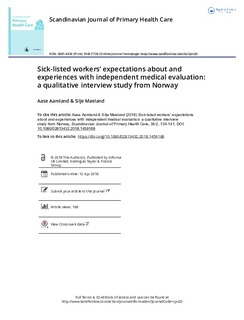| dc.contributor.author | Aamland, Aase | |
| dc.contributor.author | Mæland, Silje | |
| dc.coverage.spatial | Norway | nb_NO |
| dc.date.accessioned | 2019-02-05T13:54:13Z | |
| dc.date.available | 2019-02-05T13:54:13Z | |
| dc.date.created | 2018-07-12T11:44:36Z | |
| dc.date.issued | 2018 | |
| dc.identifier.citation | Aamland, A., & Maeland, S. (2018). Sick-listed workers’ expectations about and experiences with independent medical evaluation: A qualitative interview study from Norway. Scandinavian Journal of Primary Health Care, 36(2), 134-141. | nb_NO |
| dc.identifier.issn | 0281-3432 | |
| dc.identifier.uri | http://hdl.handle.net/11250/2583992 | |
| dc.description.abstract | Purpose: To reduce the country’s sick leave rate, Norwegian politicians have suggested independent medical evaluations (IMEs) for sick-listed workers. IME was tested in a large, randomized controlled trial in one Norwegian county (Evaluation of IME in Norway, or ‘the NIME trial’). The current study´s aim was to explore sick-listed workers’ expectations about and experiences with participating in an IME.
Material and methods: Nine individual semi-structured telephone interviews were conducted. Our convenience sample included six women and three men, aged 35–59 years, who had diverse medical reasons for being on sick leave. Systematic text condensation was used for analysis.
Results: The participants questioned both the IME purpose and timing, but felt a moral obligation to participate. Inadequate information provided by their general practitioner (GP) to the IME doctor was considered burdensome by several participants. However, most participants appreciated the IME as a positive discussion, even if they did not feel it had any impact on their follow-up or return-to-work process.
Conclusions: According to the sick-listed workers the IMEs were administered too late and disturbed already initiated treatment processes and return to work efforts. Still, the consultation with the IME doctor was rated as a positive encounter, contrary to their expectations. Our results diverge from findings in other countries where experiences with IME consultations have been reported as predominantly negative. These findings, along with additional, upcoming evaluations, will serve as a basis for the Norwegian government’s decision about whether to implement IMEs on a regular basis. | nb_NO |
| dc.language.iso | eng | nb_NO |
| dc.publisher | Taylor & Francis | nb_NO |
| dc.rights | Navngivelse-Ikkekommersiell 4.0 Internasjonal | * |
| dc.rights.uri | http://creativecommons.org/licenses/by-nc/4.0/deed.no | * |
| dc.subject | general practice | nb_NO |
| dc.subject | sick leave | nb_NO |
| dc.subject | independent medical evaluation | nb_NO |
| dc.subject | workers' compensation | nb_NO |
| dc.subject | qualitative research | nb_NO |
| dc.title | Sick-listed workers' expectations about and experiences with independent medical evaluation: A qualitative interview study from Norway | nb_NO |
| dc.type | Journal article | nb_NO |
| dc.type | Peer reviewed | nb_NO |
| dc.description.version | publishedVersion | nb_NO |
| dc.rights.holder | © 2018 The Author(s). | nb_NO |
| dc.subject.nsi | VDP::Medisinske Fag: 700::Helsefag: 800 | nb_NO |
| dc.source.pagenumber | 134-141 | nb_NO |
| dc.source.volume | 36 | nb_NO |
| dc.source.journal | Scandinavian Journal of Primary Health Care | nb_NO |
| dc.source.issue | 2 | nb_NO |
| dc.identifier.doi | 10.1080/02813432.2018.1459168 | |
| dc.identifier.cristin | 1596880 | |
| cristin.unitcode | 203,3,11,0 | |
| cristin.unitname | Institutt for ergo/fysio/radio - Bergen | |
| cristin.ispublished | true | |
| cristin.fulltext | original | |
| cristin.qualitycode | 1 | |

